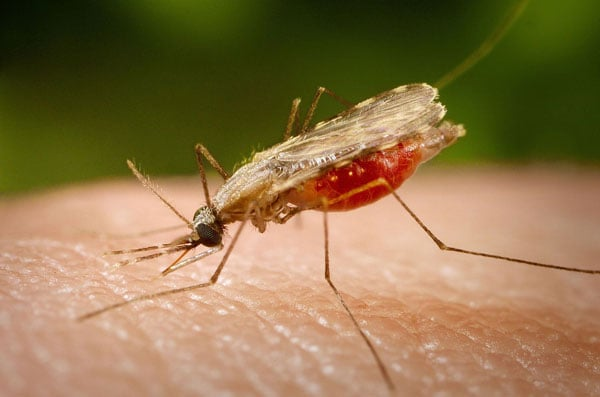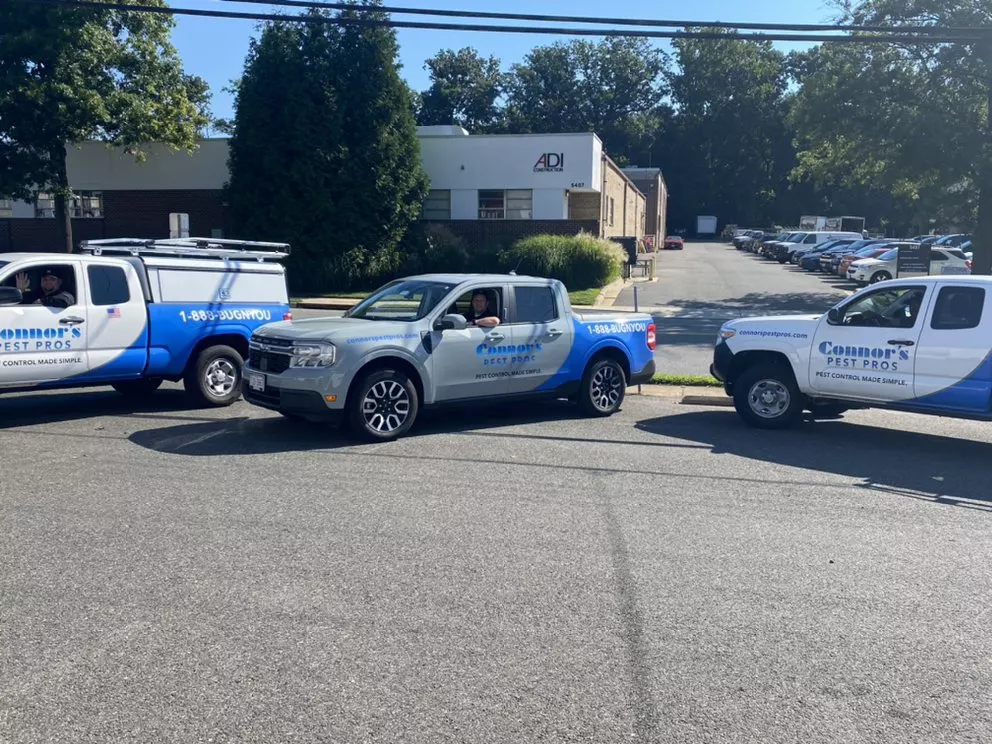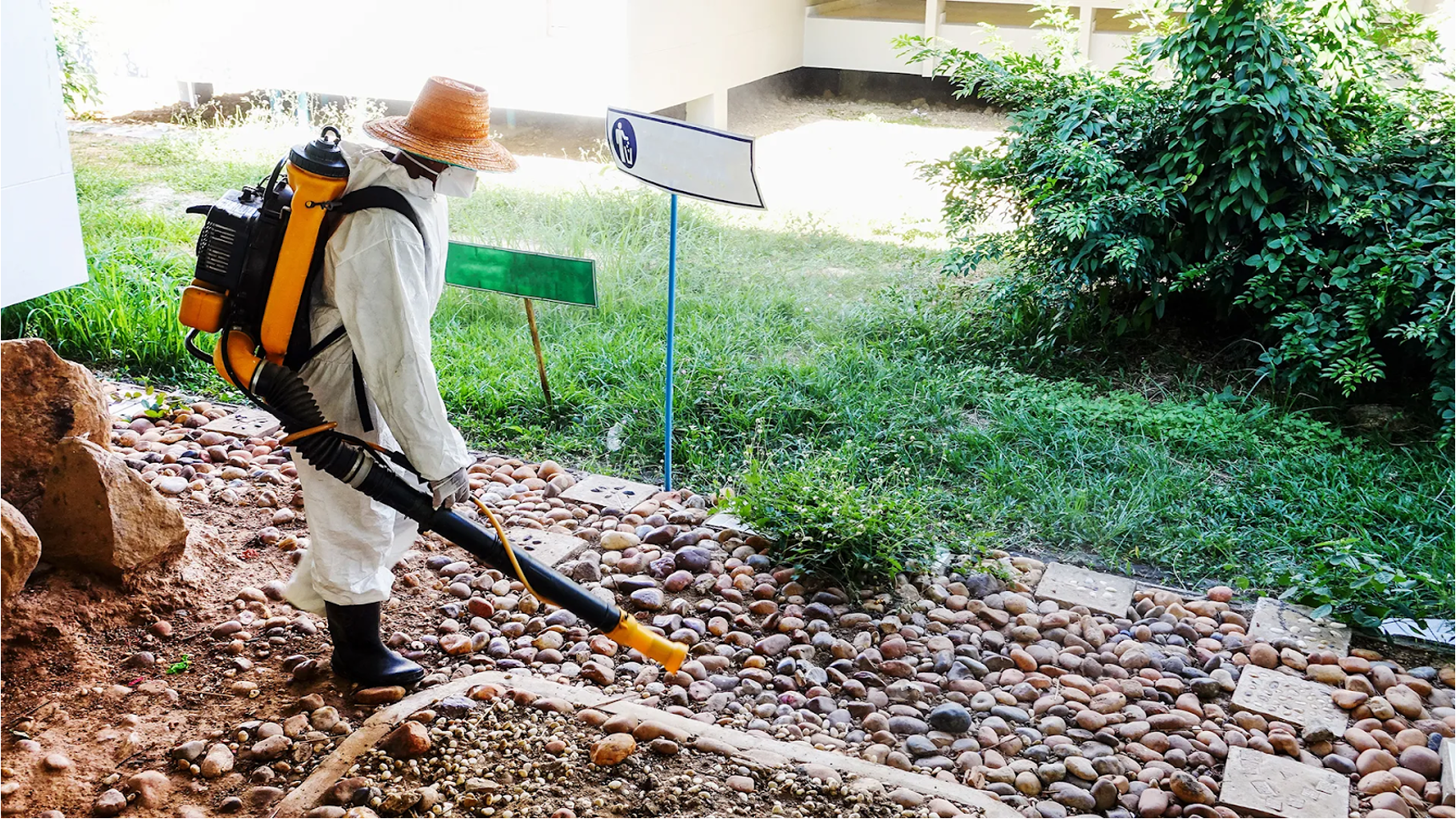Key Takeaways
- Larvicides stop mosquitoes before they even get started – they target larvae in water, shutting down their chance of becoming biting adults.
- There are two powerful types: chemical and biological – each works differently but with the same goal, which is to eliminate the threat before it spreads.
- Larvicides are strategically applied to standing water, which is the breeding ground for mosquitoes.
- The impact is a massive reduction in mosquito-borne disease risks.
- Connor’s Pest Pros’ Mosquito Control Service offers recurring or one-time treatments with a 100% satisfaction guarantee. Our expert technicians inspect your yard, explain findings, and apply targeted treatments while providing personalized tips for a mosquito-free space.
What Are Larvicides?
Larvicides are chemical or biological agents that stop mosquito larvae from growing into biting, disease-spreading adults. By targeting them early, they help keep mosquito numbers down and reduce the risk of illnesses like dengue, West Nile virus, and Zika.

Why does this matter? Since adult mosquitoes are the ones causing all the trouble, cutting them off before they mature is one of the best ways to prevent outbreaks.
Types of Larvicides: Chemical and Biological
Larvicides come in two main types:
- Chemical larvicides (like methoprene and temephos) mess with mosquito larvae’s growth, stopping them from reaching adulthood.
- Biological larvicides rely on natural bacteria or toxins to kill larvae. A popular choice is Bacillus thuringiensis israelensis (Bti), which specifically targets mosquito larvae without harming other wildlife—making it a safer, more eco-friendly option.
Larvicides vs. Adulticides: What’s the Difference?
It’s simple—larvicides stop mosquitoes before they become a problem, while adulticides kill the ones already buzzing around.
Adulticides, usually applied as sprays or fogging, offer quick relief by wiping out adult mosquitoes. Larvicides, on the other hand, tackle the problem at its root, stopping mosquitoes before they become a bigger issue and keeping their numbers down over time.
|
Connor’s Pest Pros: Family-Owned Pest Control Experts Choose Your Pest Protection Solution:
Customer Praise:
★★★★★ “Quick to answer my call and available same-day… I recommend them to anyone looking for pest control in NOVA.” – Jacquelyn L.
Why Choose Connor’s Pest Pros:
|
How Larvicides Work
Breaking the Life Cycle of Mosquitoes
Larvicides prevent mosquitoes from ever getting a chance to bite. They disrupt the mosquito life cycle early by attacking the larval stage, which stops the emergence of new adults. And that’s crucial because adult mosquitoes are the vectors of diseases like Zika and the West Nile virus.

Larvicides must be applied to standing water, which is a mosquito’s preferred breeding ground, in order to be effective.
Mosquitoes lay their eggs in ditches, ponds, and even tiny puddles. Controlling mosquito populations requires identifying and treating these areas.
Stopping Mosquitoes Where They Breed
The best way to stop mosquitoes? Go straight to the source. Larvicides work by treating the spots where mosquitoes breed, cutting them off before they can mature. Common breeding sites include stagnant water in ponds, birdbaths, ditches, and even clogged gutters. Without treatment, these areas can quickly become mosquito hotspots.
How Larvicides Are Applied
- Ground spraying works best for smaller spots like backyard ponds, ditches, and other local breeding areas.
- Aerial spraying covers large areas fast, with planes treating wide regions in a short time.
- Drones are the newest tool in the mix, perfect for reaching tricky spots that are tough to access with traditional methods.
No matter the method, the goal stays the same—stop mosquitoes before they become a problem. By tackling the problem early, larvicides help keep mosquito numbers low and reduce the risk of mosquito-borne diseases.
Advantages of Using Larvicides
Hitting Mosquitoes Where They Breed
Precise application of larvicides to breeding sites (e.g., stagnant water) reduces mosquito populations at their source. This minimizes harm to other wildlife and avoids the widespread impact of broad-spectrum insecticides.
Keeping Mosquito Numbers Down
Larvicides lowers transmission of related diseases by eliminating larvae before they become disease-carrying adults. A review of bacterial larvicides in sub-Saharan Africa (SSA) found that Microbial agents like Bti and Bacillus sphaericus (Bs) reduce larval density by 63–100% in treated habitats.
Keeping Mosquito-Borne Illnesses in Check
It also lowers transmission of malaria, Zika, dengue, and West Nile virus by eliminating larvae before they become disease-carrying adults.
A More Comfortable, Mosquito-Free Life

Reduced mosquito populations enable safer outdoor activities in residential and recreational areas, improving comfort and community well-being.
Integrated Pest Management (IPM)
Larvicides play a vital role in a well-rounded mosquito control plan. They team up with repellents, adulticides, and simple fixes like draining standing water to keep mosquito populations under control. By combining different methods, this approach improves results without depending too much on any single solution.
Best Practices for Larvicide Application
- Confirm Larvae Presence: Check for larvae before applying larvicides using dip sampling or other surveillance methods. This helps target the right areas and avoids wasting treatments.
- Match Larvicide to Habitat/Stage: Choose the right larvicide based on the environment. Bti and Bs work best in standing water, while methoprene stops larvae from maturing.
- Follow EPA Guidelines: Stick to EPA-approved instructions for dosage, timing, and safety to avoid environmental damage or legal issues.
- Targeted Application: Use the right tools for the job—handheld sprayers for small areas, drones for hard-to-reach spots, and trucks for larger wetlands.
- Consider a Professional Pest Control Service: Need extra protection? Let the pros handle it!
- Combine with Non-Chemical Controls: Boost effectiveness by pairing larvicides with water management (e.g., pouring out still water from containers every 7 days) and biological controls like predator insects.
Connor’s Pest Pros Tackles Mosquitoes Where They Begin
Imagine stopping mosquitoes before they ever have the chance to bite. That’s exactly what happens when we target these pests during their vulnerable larval stages! By disrupting their development early, we prevent entire generations of mosquitoes from ever taking flight—and that means fewer buzzing nuisances ruining your outdoor gatherings.

This scientific approach drives everything we do at Connor’s Pest Pros Mosquito Control Service.
Our team doesn’t just spray randomly and hope for the best. We study your yard, identify where mosquitoes are developing, and create a targeted treatment plan specifically for your property. From routine protection throughout mosquito season to quick solutions for your upcoming backyard barbecue, we’ve got your outdoor space covered.
Lock in year-round protection with Connor’s 365 + Mosquito that’s just $63/month! We’ll defend your home against mosquitoes so that you can relax worry-free. With 415+ five-star reviews and a 100% satisfaction guarantee, we’re the trusted choice for pest, termite, and mosquito control.
Give us a call or request a FREE quote today—we’ll take care of those bloodsuckers for you!
Frequently Asked Questions (FAQ)
How long do larvicides remain effective after application?
Larvicides usually work for a few weeks, but factors like rainfall and water flow can shorten their effectiveness. Keeping an eye on treated areas and reapplying when needed helps keep mosquito numbers in check.
Are larvicides safe for the environment and non-target species?
When used properly, chemical larvicides have little impact on the environment, but biological options are an even safer choice. Always follow the product instructions, and if you’re unsure, a pest control expert can help with safe application.
When is the best time of year to apply larvicides?
The warmer months are prime time for mosquito breeding, making them the best time to apply larvicides. Watching for mosquito activity early in the season can help prevent a bigger problem later on.
Can larvicides be used in residential areas safely?
Absolutely! When applied the right way, larvicides are safe for residential areas. Treating standing water—like birdbaths, flower pots, and clogged gutters—can make a big difference in cutting down mosquito populations. Regular maintenance keeps your outdoor space more comfortable.
How does Connor’s Pest Pros’ Mosquito Control Service work?
Our trained technicians at Connor’s Pest Pros inspect your property, identify breeding sites, and create a customized treatment plan for your yard. We offer seasonal protection or one-time treatments for special events—backed by our 100% Satisfaction Guarantee. If mosquitoes come back, so do we!



